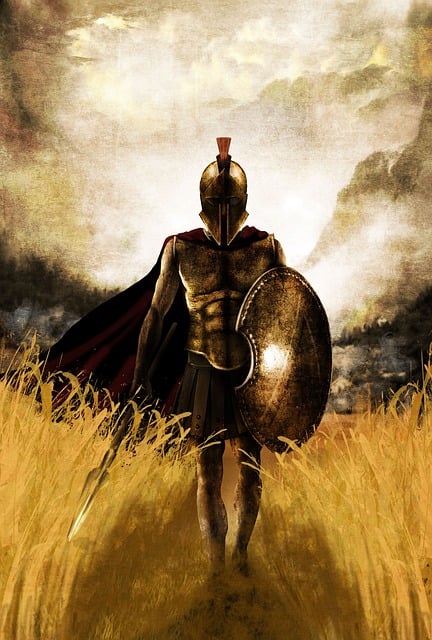Exploring the Greek City-States: Athens and Sparta
In the ancient world, Greece was not a unified nation but a collection of independent city-states, each with its own government, culture, and traditions. Among these city-states, Athens and Sparta emerged as two of the most prominent and influential powers, each representing distinct ideals and values that shaped the course of Greek history and civilization.
Athens: The Birthplace of Democracy
Ancient Greece stands as a crucible of civilization, a testament to the ingenuity, creativity, and philosophical depth of humanity. Among its many illustrious city-states, Athens shines as a beacon of democracy, intellectual inquiry, and artistic splendor. Situated in the region of Attica, Athens emerged as the heart of Greek culture, leaving an indelible mark on Western civilization that resonates to this day.

The Rise of Athenian Democracy
At the dawn of the 6th century BCE, Athens embarked on a revolutionary experiment in governance, pioneering the concept of democracy. Unlike the autocratic regimes prevalent in much of the ancient world, Athens entrusted power to its citizens, allowing them to participate directly in decision-making processes through the Athenian Assembly. Male citizens, though excluding women, foreigners, and slaves, enjoyed rights unparalleled in their time, shaping the destiny of their city-state through debate and voting.
The democratic ideals of Athens found expression in its institutions and civic life, fostering a sense of civic duty and collective responsibility. The Assembly, convened regularly on the Pnyx hill, served as the forum for citizens to debate policies, enact laws, and elect officials. The principle of isonomia, equality before the law, underpinned Athenian democracy, ensuring that all citizens had a voice in the affairs of the state.
The Age of Pericles: A Golden Era
The 5th century BCE heralded the zenith of Athenian civilization, known as the “Age of Pericles” in honor of the statesman who shaped its destiny. Pericles, a visionary leader and orator, guided Athens through a period of unprecedented growth and prosperity. Under his stewardship, the city-state witnessed a flowering of artistic and intellectual achievement, unparalleled in the annals of history.
The construction of the Parthenon atop the Acropolis stands as a testament to Athens’ cultural and architectural brilliance. Dedicated to the goddess Athena, the Parthenon embodied the ideals of Athenian democracy, serving as both a religious sanctuary and a symbol of civic pride. Its majestic columns and intricate sculptures, including the renowned frieze depicting the Panathenaic procession, immortalized the glory of Athens for posterity.
The Delian League: Athens’ Naval Empire
Athens’ ascendance was not confined to the realm of culture and politics but extended to the seas as well. The formation of the Delian League, a coalition of city-states in the Aegean region, solidified Athens’ naval supremacy and economic dominance. Originally established to repel Persian incursions, the Delian League evolved into an instrument of Athenian imperialism, with member states contributing tribute to finance Athens’ ambitious projects and military ventures.
The wealth and power amassed by Athens fueled its ambitious agenda, transforming the city-state into a formidable maritime empire. The Athenian navy, renowned for its triremes and skilled sailors, patrolled the Aegean Sea, safeguarding trade routes and projecting Athenian influence across the Mediterranean. The riches flowing into Athens’ coffers funded public works, including the construction of the Long Walls, fortifications connecting Athens to its port of Piraeus, ensuring the city’s strategic security.
The Peloponnesian War: A Clash of Titans
Despite its cultural and military prowess, Athens’ dominance provoked resentment and hostility among its rivals, chief among them Sparta, the preeminent military power of the Peloponnese. The simmering tensions between Athens and Sparta erupted into open conflict in 431 BCE, igniting the flames of the Peloponnesian War, a protracted struggle for supremacy that would reshape the Greek world.
The Peloponnesian War, spanning nearly three decades, pitted the democratic ideals of Athens against the martial discipline of Sparta, testing the resilience of Greek civilization to its core. The conflict, marked by pitched battles, sieges, and shifting alliances, exacted a heavy toll on both sides, culminating in the eventual defeat of Athens in 404 BCE.
Legacy of Athens: A Beacon for Humanity
Despite its defeat in the Peloponnesian War and subsequent decline, the legacy of Athens endures as a beacon for humanity, inspiring generations with its commitment to democracy, intellectual inquiry, and artistic expression. The principles of Athenian democracy, though imperfect and exclusionary, laid the groundwork for modern notions of citizenship and governance, shaping the course of Western civilization.
The achievements of ancient Athens, from its philosophical inquiries to its architectural marvels, continue to captivate the imagination and fuel the pursuit of knowledge and excellence. As we gaze upon the ruins of the Acropolis and ponder the legacy of Pericles and his contemporaries, we are reminded of the enduring power of human creativity and the enduring quest for freedom and enlightenment that defines the human spirit.
Sparta: The Warrior Society
In the annals of ancient Greece, few city-states evoke the image of martial prowess and collective duty as vividly as Sparta. Situated in the rugged landscape of the southern Peloponnese, Sparta stood as a bastion of militarism and discipline, forging a society where the virtues of courage, obedience, and sacrifice reigned supreme. In stark contrast to the democratic ideals of Athens, Sparta epitomized a way of life centered on the art of war and the collective welfare of the state.
The Spartan Ethos: Discipline and Militarism
At the heart of Spartan society lay the ethos of discipline and militarism, instilled in its citizens from a tender age. Born into a world where the sword was mightier than the pen, Spartan youths underwent rigorous training and education in the agoge, a state-controlled system designed to mold them into formidable warriors. From the age of seven, boys were consigned to the care of the state, subject to a regimen of physical conditioning, weapons training, and moral instruction aimed at cultivating obedience and resilience in the face of adversity.
The agoge, overseen by stern instructors known as paidagogoi, emphasized the virtues of endurance, camaraderie, and self-sacrifice, instilling in Spartans a sense of duty to their comrades and the collective welfare of the polis. Physical prowess was revered above all else, with Spartan youths tested in the crucible of combat and competition, where only the strongest and most resilient could hope to succeed.

The Spartan Social Order: Hierarchy and Helotry
Central to Spartan society was a rigid social hierarchy, predicated on the division between the warrior class, known as Spartiates, and the subordinate masses. At the apex of the social order stood the Spartiates, an elite caste of citizen-soldiers bound by a code of honor and duty to the state. Spartiates enjoyed privileges denied to their counterparts in other Greek city-states, including the right to participate in political affairs and exemptions from manual labor.
Beneath the Spartiates lay the free non-citizens, comprising artisans, merchants, and other residents who lacked the full rights of citizenship but enjoyed a measure of freedom and autonomy. While not subject to the same degree of martial discipline as the Spartiates, free non-citizens contributed to the economic life of Sparta, sustaining its military machine through their labors and enterprise.
At the base of Spartan society lay the helots, a servile class of enslaved individuals who toiled the land to sustain the city-state’s agrarian economy. Helots, primarily drawn from the conquered populations of neighboring territories, endured lives of hardship and oppression, subject to the whims of their Spartan overlords. Despite their numerical superiority, helots lived in a state of perpetual subjugation, their labor exploited to uphold the Spartan way of life.
The Spartan Ideal: Communal Harmony and Sacrifice
Unlike Athens, which exalted individual freedoms and intellectual pursuits, Sparta prized communal harmony and the collective good above all else. Every aspect of Spartan life, from the cradle to the grave, was permeated by a sense of duty and sacrifice in service to the polis. Spartans were taught to revere the state above family and personal ambition, willingly subordinating their individual interests to the needs of the community.
This ethos of selflessness and solidarity found expression in Spartan military campaigns, where warriors fought not for glory or personal gain but for the preservation of Spartan honor and the defense of their homeland. Spartans, renowned for their stoicism and resilience in battle, regarded death in the service of Sparta as the highest honor, embracing the prospect of a glorious demise on the field of valor.
The Legacy of Sparta: Lessons of Discipline and Resilience
Though the glory of Sparta has long since faded into the mists of time, its legacy endures as a testament to the virtues of discipline, sacrifice, and collective endeavor. The Spartan ideal, immortalized in the annals of history and myth, continues to inspire awe and admiration for its uncompromising commitment to duty and honor.
In an age of uncertainty and turmoil, the example of Sparta serves as a reminder of the enduring power of human resolve and resilience in the face of adversity. Though the world may have changed since the days of Leonidas and Thermopylae, the lessons of Spartan discipline and unity remain as relevant today as they were in the golden age of Greece. As we gaze upon the ruins of ancient Sparta, we are reminded of the enduring legacy of a city-state that dared to defy the odds and forge a society built on the bedrock of martial virtue and communal solidarity.
The Peloponnesian War: Clash of Titans
In the annals of ancient Greece, few conflicts loom as large or leave as profound a mark on history as the Peloponnesian War. Fought between the great powers of Athens and Sparta, along with their respective allies, from 431 BCE to 404 BCE, this protracted struggle represents a pivotal moment in Greek history, laying bare the inherent tensions between democracy and militarism, expansionism and tradition.

Origins of Conflict: Athens vs. Sparta
The seeds of the Peloponnesian War were sown in the shifting alliances and power dynamics of the Greek world. Athens, riding high on the crest of its naval supremacy and expansive empire, sought to extend its influence and consolidate its hegemony over the Aegean and beyond. Emboldened by the wealth flowing into its coffers from tributary states and the riches of its overseas colonies, Athens emerged as the preeminent naval power of the Greek world, its imperial ambitions casting a long shadow over its rivals.
In contrast, Sparta, the traditional powerhouse of the Peloponnese, viewed with growing alarm the rise of Athenian hegemony and the spread of democratic ideals beyond its borders. Fearing the erosion of its own way of life and the encroachment of Athenian power, Sparta marshaled its allies and rallied support from other city-states in the Peloponnese, forming the Peloponnesian League to counter Athens’ influence.
The Dynamics of War: Athenian Naval Supremacy vs. Spartan Tenacity
The Peloponnesian War unfolded as a series of military campaigns, sieges, and political maneuvering, as Athens and Sparta jockeyed for supremacy on land and sea. Athens, buoyed by its formidable navy and the strategic advantage of its Long Walls, sought to avoid direct confrontation with the Spartan phalanx, preferring instead to wage a war of attrition and harassment against its enemy’s allies.
Under the leadership of statesmen such as Pericles, Athens pursued a strategy of naval dominance and economic blockade, leveraging its maritime empire to choke off vital resources and undermine Spartan resolve. The walls of Athens, stretching from the city to its port of Piraeus, served as a bulwark against Spartan incursions, allowing the Athenians to weather sieges and sustain their naval operations.
Sparta, for its part, relied on the martial prowess of its hoplite warriors and the steadfastness of its allies to confront the Athenian threat. Led by commanders such as Brasidas and Lysander, Spartan forces waged a dogged campaign of attrition against Athenian holdings in the Peloponnese and beyond, seeking to break the stranglehold of Athenian imperialism and restore the balance of power in the Greek world.
The Turning Tide: Persian Intervention and Athenian Defeat
As the war dragged on, the balance of power began to shift in favor of Sparta, aided in no small part by the intervention of Persia, Athens’ perennial adversary to the east. In a bid to undermine Athenian naval supremacy, Persia supplied funds and support to Spartan commanders such as Lysander, enabling them to build and equip a fleet capable of challenging Athens’ dominance at sea.
The turning point of the war came in 405 BCE, with the decisive naval victory of the Spartan fleet over the Athenians at Aegospotami. Caught off guard and outmaneuvered by the superior tactics of Lysander, the Athenian navy suffered a crushing defeat, its ships burned and its sailors captured or slain. With its maritime lifeline severed and its empire crumbling, Athens faced a stark choice: surrender or face utter destruction.
Legacy of the Peloponnesian War: The Decline of Athens and Sparta
The Peloponnesian War concluded in 404 BCE with the surrender of Athens, marking the end of its golden age and the dismantling of its imperial ambitions. The once-proud city-state, humbled and exhausted by decades of conflict, now languished under Spartan hegemony, its democratic ideals tarnished and its power diminished.
Yet, Sparta’s triumph proved short-lived, as internal discord and external pressures eroded its influence in the years following the war. The dreams of a Spartan hegemony faded into memory, as the city-state struggled to adapt to a world irrevocably changed by the ravages of war and the inexorable march of time.
In the annals of history, the Peloponnesian War stands as a cautionary tale of the perils of hubris and the futility of war. The clash of Athens and Sparta, though waged with spears and ships, reverberates across the centuries as a testament to the frailty of empires and the enduring quest for peace and reconciliation in a world torn asunder by strife and discord.
Legacy and Influence: Athenian Democracy and Spartan Discipline
In the tapestry of ancient Greek civilization, the legacies of Athens and Sparta stand as enduring symbols, each weaving a unique narrative of contrasting ideals and values that have left an indelible mark on Western thought and societal structures. The democratic principles of Athens, championing individual freedoms and intellectual inquiry, juxtapose with Sparta’s emphasis on discipline, military prowess, and collective duty. As we delve into the legacies of these city-states, we uncover the enduring influence they have had on shaping contemporary notions of citizenship, governance, and societal organization.

Athenian Democracy: A Beacon of Freedom and Inquiry
Athens, the birthplace of democracy, emerges as a beacon of freedom and intellectual inquiry that has shaped the very foundations of Western political thought. The democratic system, instituted in the 6th century BCE, represented a radical departure from the autocratic rule prevalent in ancient societies. Athenian citizens, albeit limited to males and excluding women, foreigners, and slaves, were empowered to participate directly in decision-making processes, attend the Assembly, and even serve in government positions.
The principles of Athenian democracy, though imperfect and exclusionary by contemporary standards, laid the groundwork for modern notions of citizenship and governance. The Athenian Assembly, convened on the Pnyx hill, provided a platform for citizens to engage in open debate, enact laws, and elect officials, fostering a sense of civic duty and collective responsibility. The legacy of Athens resonates in the evolution of democratic systems worldwide, emphasizing the importance of individual rights, the rule of law, and the pursuit of knowledge and inquiry.
The intellectual flourishing during the “Age of Pericles” further solidified Athens’ legacy. The philosophical inquiries of figures like Socrates, Plato, and Aristotle, coupled with the artistic achievements epitomized by the Parthenon, showcased the city-state’s commitment to intellectual and cultural pursuits. Today, Athenian democracy remains a touchstone for societies striving to balance individual freedoms with collective decision-making, offering valuable lessons in the ongoing quest for just and inclusive governance.
Sparta: Discipline, Sacrifice, and Communal Solidarity
In stark contrast to Athens, Sparta epitomized a society built on discipline, sacrifice, and communal solidarity. Renowned for its formidable army, the Spartan way of life centered around the agoge, a state-controlled system that subjected its citizens, known as Spartiates, to rigorous military training and education from a young age. The Spartiates were expected to prioritize military service and the collective good of the state over individual pursuits, with the government assuming responsibility for their material needs.
Spartan society, characterized by a strict social hierarchy, placed the warrior class at the top, followed by free non-citizens, and a large population of helots, enslaved individuals working the land. While this system was instrumental in maintaining military dominance, it also generated internal tensions and instability. The Spartan emphasis on discipline and sacrifice found expression in their military campaigns, where warriors fought not for personal glory but for the collective honor and defense of Sparta.
Despite its seeming harshness and authoritarianism by modern standards, Sparta’s legacy endures as a symbol of civic duty, sacrifice, and communal harmony. The city-state’s model of social organization prompts contemplation on alternative approaches to governance and the delicate balance between individual liberties and collective responsibilities.
Enduring Influence: Lessons from Ancient Greece
The enduring influence of Athens and Sparta continues to shape contemporary discourse on governance, citizenship, and societal values. Athens, with its democratic ideals and emphasis on individual freedoms, serves as a source of inspiration for democratic societies worldwide, reminding us of the importance of active civic engagement, protection of individual rights, and the pursuit of knowledge.
On the other hand, Sparta’s legacy, with its emphasis on discipline and communal solidarity, challenges conventional thinking about the balance between individual freedoms and societal cohesion. The Spartan model prompts reflection on the role of civic duty, sacrifice, and collective responsibility in fostering a strong and resilient society.
In conclusion, the legacies of Athens and Sparta, though rooted in ancient Greece, transcend time and continue to shape our understanding of governance and societal organization. As we navigate the complexities of the modern world, the lessons gleaned from these city-states provide a rich tapestry of ideas, offering valuable insights into the enduring quest for a harmonious and just society.
Conclusion
In conclusion, the city-states of Athens and Sparta represent contrasting yet complementary aspects of Greek civilization, each contributing to the rich tapestry of Western culture and thought. Their stories, marked by triumphs and tragedies, continue to resonate across the centuries, reminding us of the enduring legacy of ancient Greece and the timeless ideals that continue to shape our world today.



I want to thank you for this very good read!!
I certainly enjoyed every bit of it.